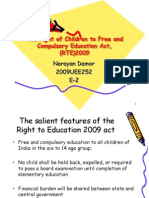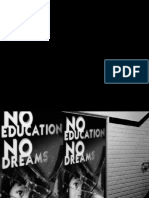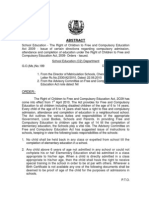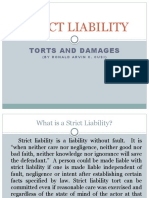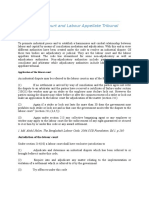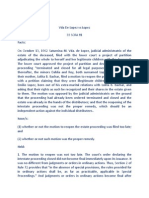Rte
Rte
Uploaded by
Cyril VictorCopyright:
Available Formats
Rte
Rte
Uploaded by
Cyril VictorOriginal Title
Copyright
Available Formats
Share this document
Did you find this document useful?
Is this content inappropriate?
Copyright:
Available Formats
Rte
Rte
Uploaded by
Cyril VictorCopyright:
Available Formats
Every child between the ages of 6
to 14 years has the right to free and compulsory education. The government schools shall provide free education to all the children and the schools will be managed by school management committees (SMC). Private schools shall admit at least 25% of the children in their schools without any fee. The National Commission for Elementary Education shall be constituted to monitor all aspects of elementary education.
The health, education and creative abilities of our children and young people will determine the well-being and strength of our nation. Education is the key to progress. It empowers the individual. It enables a nation." -Mr. Manmohan Singh
Indias education scenario hasnt been very impressive but it has definitely gained pace over the years
Free and compulsory education to all children of India in the 6 to 14 age group; No child shall be held back, expelled, or required to pass a board examination until completion of elementary education; A child above six years of age has not been admitted in any school or though admitted, could not complete his or her elementary education, then, he or she shall be admitted in a class appropriate to his or her age; Provided that where a child is directly admitted in a class appropriate to his or her age, then, he or she shall, in order to be at par with others, have a right to receive special training, in such manner, and within such time limits, as may be prescribed: Provided further that a child so admitted to elementary education shall be entitled to free education till completion of elementary education even after fourteen years
Proof of age for admission: For the purposes of admission
to elementary education. The age of a child shall be determined on the basis of the birth certificate issued in accordance with the provisions of the Births. Deaths and Marriages Registration Act, 1856 or on the basis of such other document, as may be prescribed. No child shall be denied admission in a school for lack of age proof A child who completes elementary education shall beawarded a certificate; Calls for a fixed student-teacher ratio; Will apply to all of India except Jammu and Kashmir;
Children with disabilities covered under Persons with
Disabilities (Equal Opportunities, Protection and Full Participation) Act,1996.
PWD Act does not cover children with cerebral palsy,
mental retardation, autism and multiple disabilities, who are covered under National Trust for Welfare of Persons with Autism, Cerebral Palsy, Mental Retardation and Multiple Disabilities Act,1999
1)Help to Poor Students:-Now, any student can claim for education with the provision of required facilities, what he needs is a little support of the government and some enthusiastic social workers. 2)Expectations from Private Schools:-The Act also orders he Private educational institutions to reserve25 percent seats for children from the weaker and disadvantaged sections and this ration is always expected to be chock-a-block. Next, all the schools have been asked to admit such students without admission tests and other documental requisites. Also, the schools can't refuse the entry of students with reasons like late or early admission, full seats etc. However this decision is being followed by huge protests. 3)Financial Help from Government:- Furthermore, the Finance Commission has provided a sum of Rs25,000croreto the states for implementation of the Act. Mr. Sibal has further announced that the government has full arrangements of the funds required for efficient implementation of the Act.
meeting scarce service providers. Maintaining student-teacher ratio of 30:1(the current being 50:1 and 80:1 with some schools). Allocated budgets to fructify goals low with 55:45 sharing of funds between centre and state
For education to be a meaningful right it must be available, Accessible, acceptable and adaptability Availability that education is free and government-funded and that there is adequate infrastructure and trained teachers able to support education delivery. Accessibility that the system is non-discriminatory and accessible to all, and that positive steps are taken to include the most marginalised. Acceptability that the content of education is relevant, nondiscriminatory and culturally appropriate, and of quality; that the school itself is safe and teachers are professional. Adaptability that education can evolve with the changing needs of society and contribute to challenging inequalities, such as gender discrimination, and that it can be adapted locally to suit specific contexts
Establishing schools in the neighbourhood Upgrading all EGS / AIE into regular schools
Opening schools in unservedareas
roviding additional classrooms and facilitie s y
You might also like
- Legislative Brief: The Right To Education Bill, 2005Document8 pagesLegislative Brief: The Right To Education Bill, 2005Vanam TejasviNo ratings yet
- Right To Education Act 2009Document11 pagesRight To Education Act 2009Rda ChhangteNo ratings yet
- Righttoeducationbill2008 090915052316 Phpapp01Document10 pagesRighttoeducationbill2008 090915052316 Phpapp01Pratibha SinghNo ratings yet
- Right of Children To Free and Compulsory Education ActDocument11 pagesRight of Children To Free and Compulsory Education Actluxsoap95No ratings yet
- RTE: IntroductionDocument59 pagesRTE: IntroductionNancy NancyNo ratings yet
- Inclusive Education &right To EducationDocument18 pagesInclusive Education &right To EducationMadhu Mahesh RajNo ratings yet
- Indian Elementary EducationDocument52 pagesIndian Elementary EducationH Janardan PrabhuNo ratings yet
- Right To Education Act, 2009Document6 pagesRight To Education Act, 2009Garvit PawarNo ratings yet
- Right To EducationDocument14 pagesRight To EducationShivansh soniNo ratings yet
- Right To EducationDocument14 pagesRight To EducationPramod Savkare67% (3)
- Universal Elementary EducationDocument100 pagesUniversal Elementary EducationH.J.PrabhuNo ratings yet
- Guidelines For Special Training To OOSC Admitte Under RTEDocument86 pagesGuidelines For Special Training To OOSC Admitte Under RTEVIJAY KUMAR HEERNo ratings yet
- Right To EducationDocument21 pagesRight To EducationAmal RemeshNo ratings yet
- Condition of Education System in India: Education and Directive PrinciplesDocument5 pagesCondition of Education System in India: Education and Directive PrinciplesAnonymous G9PLGNNo ratings yet
- Right To: Education More Than A NecessityDocument24 pagesRight To: Education More Than A NecessityVivek GittuwalaNo ratings yet
- Rte 2009Document17 pagesRte 2009Narayan DamorNo ratings yet
- Chapter I - Introduction: Shri MC Chagla, Education Minister, 1964Document98 pagesChapter I - Introduction: Shri MC Chagla, Education Minister, 1964Śhamli ShahNo ratings yet
- Right To Education in IndiaDocument5 pagesRight To Education in IndiaYavanika SharmaNo ratings yet
- Right Ho Elementary EducationDocument60 pagesRight Ho Elementary EducationShobha J PrabhuNo ratings yet
- Dr. Ram Manohar Lohiya National Law University, LucknowDocument14 pagesDr. Ram Manohar Lohiya National Law University, Lucknowayush singhNo ratings yet
- Sarva Shiksha AbhiyaanDocument14 pagesSarva Shiksha Abhiyaansachin1065No ratings yet
- Elementary DR IndianDocument50 pagesElementary DR IndianShobha J PrabhuNo ratings yet
- C1 Dimensions of ChildhoodDocument18 pagesC1 Dimensions of Childhoodsanjiv kumarNo ratings yet
- Elementary EducationDocument36 pagesElementary EducationH Janardan PrabhuNo ratings yet
- Uee, Use, Rte, Ssa & RMSDocument11 pagesUee, Use, Rte, Ssa & RMSRda ChhangteNo ratings yet
- Main Features of Right To Education 2009 ActDocument1 pageMain Features of Right To Education 2009 ActzoindigenousNo ratings yet
- Rte 1Document3 pagesRte 1gaganpsingh1998No ratings yet
- Right To EducationDocument7 pagesRight To Educationruman ahmadNo ratings yet
- Right To Education Act 2009 NewDocument13 pagesRight To Education Act 2009 NewPriyanjali SinghNo ratings yet
- Right To Education, 2009Document15 pagesRight To Education, 2009Nawaz Ul Haque100% (1)
- Art 21ADocument14 pagesArt 21AAbhishek SharmaNo ratings yet
- Right To EducationDocument10 pagesRight To Educationvedantkarapurkar23No ratings yet
- Right To EducationDocument7 pagesRight To EducationMehvash ChoudharyNo ratings yet
- Rte: M N ?: ORE Than A EcessityDocument16 pagesRte: M N ?: ORE Than A EcessityPulkit KhareNo ratings yet
- Right To Education ACT, 2009: SOME ReflectionsDocument15 pagesRight To Education ACT, 2009: SOME ReflectionsTruex FriendNo ratings yet
- unit 5Document18 pagesunit 5hacker04nitinNo ratings yet
- UCSP - EducationDocument16 pagesUCSP - EducationNNo ratings yet
- Case Studies (Kyle)Document6 pagesCase Studies (Kyle)mara pukNo ratings yet
- Insights Into Editorial: Right To Education Act Will Have To Be Amended To Scrap The No Detention' PolicyDocument4 pagesInsights Into Editorial: Right To Education Act Will Have To Be Amended To Scrap The No Detention' Policyvirender_ajaykumarNo ratings yet
- Right To Education Act: What Is The Act About?Document2 pagesRight To Education Act: What Is The Act About?Rajat KashyapNo ratings yet
- Right To EducationDocument97 pagesRight To EducationSAHIL JAINNo ratings yet
- Bbmun 22 LS BGDocument36 pagesBbmun 22 LS BGAditya GillNo ratings yet
- Right To Education Bill 2005Document44 pagesRight To Education Bill 2005raveenkumarNo ratings yet
- Right To Education ActDocument3 pagesRight To Education ActŚhamli Shah100% (1)
- Right To EducationDocument8 pagesRight To EducationSAKSHI GOYALNo ratings yet
- Tips & Warnings: Critique-Essay - Html#ixzz0wqa923uqDocument3 pagesTips & Warnings: Critique-Essay - Html#ixzz0wqa923uqHärîsh KûmärNo ratings yet
- Right To Education Upsc Notes 58Document4 pagesRight To Education Upsc Notes 58raj005mokNo ratings yet
- Topic:Right To Education Act: Challenges & RemediesDocument14 pagesTopic:Right To Education Act: Challenges & RemediesNikhil Kalyan AJNo ratings yet
- G. O. No. 189 Dated 12-07-2010Document3 pagesG. O. No. 189 Dated 12-07-2010edwin_prakash7578% (9)
- Constitution of India PDFDocument7 pagesConstitution of India PDFBadboyNo ratings yet
- On Right To EducationDocument17 pagesOn Right To EducationH Janardan PrabhuNo ratings yet
- Free and Compulsory Education Act PUNJABDocument26 pagesFree and Compulsory Education Act PUNJABQaZi KhurRum Habib KhAnNo ratings yet
- B. Issues Relating To Development and Management of Social Sector - Services Relating To Education - NITHI IASDocument21 pagesB. Issues Relating To Development and Management of Social Sector - Services Relating To Education - NITHI IASNimish BassiNo ratings yet
- Primary Education in IndiaDocument9 pagesPrimary Education in IndiaPurva VermaNo ratings yet
- Right of Children To Free and Compulsory Education Act, 2009Document20 pagesRight of Children To Free and Compulsory Education Act, 2009Mirza AsifNo ratings yet
- Education in India A Detailed AnalysisDocument33 pagesEducation in India A Detailed AnalysisChandan SinghNo ratings yet
- 16 +DR RajivKumarDocument14 pages16 +DR RajivKumarnki5No ratings yet
- EssayDocument2 pagesEssayBhakti AgarwalNo ratings yet
- Preparing For Advent2Document10 pagesPreparing For Advent2Cyril VictorNo ratings yet
- Way of Cross - SilvanaDocument15 pagesWay of Cross - SilvanaCyril VictorNo ratings yet
- St. Mary'S Church, Broadfield Drive, Leyland: SUNDAY of The Year P.Document2 pagesSt. Mary'S Church, Broadfield Drive, Leyland: SUNDAY of The Year P.Cyril VictorNo ratings yet
- Article For NovemberDocument2 pagesArticle For NovemberCyril VictorNo ratings yet
- Charism: of The Daughters of The Heart of MaryDocument25 pagesCharism: of The Daughters of The Heart of MaryCyril VictorNo ratings yet
- India: Employment Law Overview 2019-2020Document34 pagesIndia: Employment Law Overview 2019-2020Satadeep DattaNo ratings yet
- False and Misleading AdvertisementsDocument5 pagesFalse and Misleading AdvertisementsPrithish MNo ratings yet
- REPORT - STRICT LIABILITY (R. Cusi)Document27 pagesREPORT - STRICT LIABILITY (R. Cusi)ayen cusiNo ratings yet
- Liquidation of Property Regimes: Acop Art. 102 Art. 103 Reason For Liquidation: Reason For LiquidationDocument7 pagesLiquidation of Property Regimes: Acop Art. 102 Art. 103 Reason For Liquidation: Reason For LiquidationRikka ReyesNo ratings yet
- Survey SheetDocument7 pagesSurvey SheetKidMonkey2299No ratings yet
- Labour Court and Labour Appellate TribunalDocument3 pagesLabour Court and Labour Appellate TribunalMinhazAhmedNeloy100% (1)
- PERSONAL - INFORMATION - SHEET - v2 2017Document2 pagesPERSONAL - INFORMATION - SHEET - v2 2017Beverly Cordero JacoboNo ratings yet
- BestMan GroomsManSpeechesDocument14 pagesBestMan GroomsManSpeechesAdam LemonsNo ratings yet
- Police ReportDocument14 pagesPolice ReportJerald CalunsagNo ratings yet
- In Re Johns-Manville Corp. - Travelers Dist CT Brief Opposing Payment 2011Document28 pagesIn Re Johns-Manville Corp. - Travelers Dist CT Brief Opposing Payment 2011Legal InsurrectionNo ratings yet
- Ant-101-Final-Exam-Assignment - Docx ZiadDocument9 pagesAnt-101-Final-Exam-Assignment - Docx ZiadZiad Al RizaNo ratings yet
- IBA Master Substantive Project 2014 - Insurance Committee PDFDocument210 pagesIBA Master Substantive Project 2014 - Insurance Committee PDFsunny verdaniNo ratings yet
- Criminal Procedure NotesDocument2 pagesCriminal Procedure NotesRap SantosNo ratings yet
- RA 8042, As Amended by RA 10022Document28 pagesRA 8042, As Amended by RA 10022Camille EspeletaNo ratings yet
- Department Examination-Pension Problem-Prepared by S.saravanan, BrteDocument72 pagesDepartment Examination-Pension Problem-Prepared by S.saravanan, Brtethamizharasi2715No ratings yet
- Padila Machine Shop VS JavilgasDocument2 pagesPadila Machine Shop VS JavilgasKornessa Paras100% (1)
- Affidavit of TruthDocument4 pagesAffidavit of TruthZero One0% (1)
- United States v. Dominick Romano, 516 F.2d 768, 2d Cir. (1975)Document5 pagesUnited States v. Dominick Romano, 516 F.2d 768, 2d Cir. (1975)Scribd Government DocsNo ratings yet
- Nevada Reports 1881-1882 (16 Nev.) PDFDocument343 pagesNevada Reports 1881-1882 (16 Nev.) PDFthadzigsNo ratings yet
- Ainsworth's Strange SituationDocument1 pageAinsworth's Strange SituationLavanya SharmaNo ratings yet
- Doctrines Prudential Bank vs. Intermediate Appellate Court, 216 SCRA 257Document5 pagesDoctrines Prudential Bank vs. Intermediate Appellate Court, 216 SCRA 257Bechay PallasigueNo ratings yet
- Virtucio v. Alegarbes (Case Digest)Document2 pagesVirtucio v. Alegarbes (Case Digest)Froilan J. AguringNo ratings yet
- Case Ethics From Canon 7-13 of Legal EthicsDocument387 pagesCase Ethics From Canon 7-13 of Legal EthicsLeonil Silvosa50% (2)
- Arta Law CSCDocument20 pagesArta Law CSCdaryl mae untalNo ratings yet
- Personaldevelopment q1 Mod7 Becomingcapableandresponsibleadolescentpreparedforadultlife v2-4Document17 pagesPersonaldevelopment q1 Mod7 Becomingcapableandresponsibleadolescentpreparedforadultlife v2-4Sciatzy Faye Tangelon75% (4)
- Po - 00928 - Bharatkumar Indrasen Trading PVT Ltd.Document3 pagesPo - 00928 - Bharatkumar Indrasen Trading PVT Ltd.sushant sanjay jadhavNo ratings yet
- Vda de Lopez Vs LopezDocument5 pagesVda de Lopez Vs LopezRap BaguioNo ratings yet
- City of Batangas VS ShellDocument1 pageCity of Batangas VS ShellPaul Barazon0% (1)
- Oparel, Sr. V Abaria (40 SCRA 128) A.C. No. 959Document3 pagesOparel, Sr. V Abaria (40 SCRA 128) A.C. No. 959Jadz Tiu TamayoNo ratings yet
- Customs Administrative Order TemplateDocument6 pagesCustoms Administrative Order TemplateAlthea AcasNo ratings yet















